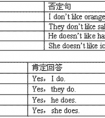If you have any problems, you can ask your parents to give you ______. [ ]A. a piece adviceB. an adviceC. some advice D. some advices-九年级英语
题文
| If you have any problems, you can ask your parents to give you ______. |
|
[ ] |
| A. a piece advice B. an advice C. some advice D. some advices |
答案
| C |
据专家权威分析,试题“If you have any problems, you can ask your parents to give y..”主要考查你对 不可数名词,不定代词 等考点的理解。关于这些考点的“档案”如下:
不可数名词不定代词
考点名称:不可数名词
- 不可数名词:
是指不能以数目来计算,不可以分成个体的概念、状态、品质、感情或表示物质材料的东西;
它一般没有复数形式,只有单数形式,它的前面不能用不定冠词a / an ,若要表示它的个体意义时,一般要与一个名词短语连用,相当于中文里的【一 +(量词)+ 名词】,其中的量词意义依与具体的名词搭配而定。
例如:
a cup of tea 一杯茶
a piece of news 一则新闻
two pieces of paper 两张纸
three glasses of water 三杯水
five bags of rice 五袋大米 - 不可数名词量的表示:
1、不可数名词的数量一般用some , much , a lot of , lots of , a bit of , a little , little等数量形容词表示。
eg: some meat 一些肉
a lot of money很多钱
a little water 一点水
2、不可数名词的数量还可以用适当的量词(由普通名词充当)作单位来表示,
结构为“数词+量词(普通名词)+ of + 不可数名词”。
其单复数变化就体现在普通名词上。
eg: a piece of paper 一张纸
three pieces of paper 三张纸
3、一些常见的用来表示不可数名词数量的词
①piece(条、块、片、张、份、则)
eg: a piece of meat 一块肉
a piece of bread 一片面包
two pieces of advice 两条意见
a piece of news 一条消息/一则新闻
②glass(玻璃杯) , cup(茶杯) , bottle(瓶)
eg: a glass of milk 一杯牛奶
a cup of tea 一杯茶
six bottles of beer 六瓶啤酒
③loaf(条)、bar(块)、tin(听,罐)
eg: a loaf of bread 一条面包
a bar of soap 一块肥皂
a tin of tobacco 一听/罐烟丝
④basket(篮)、bag(袋)、box(箱,盒)
eg: a basket of food 一篮食物
five bags of rice 五袋大米
a box of wine 一箱白酒
⑤kilo(公斤)、pound(磅)
eg: a pound of sugar 一磅糖
two kilos of meat 二公斤肉
half a pound of coffee 半磅咖啡
a quarter of a pound of cheese 四分之一磅奶酪
a quarter of a kilo of rice 半斤大米 - 不可数名词记忆歌诀:
不可数名词很特殊,
六点用法应记清楚:
一是没有复数形式,
二作主语谓须单数①,
三是其前不用a(an),
四是修饰不用基数②,
五可much, some和any来修饰,
六表数量用“计量+of”短语③。
[说明]:
①不可数名词作主语时,谓语用单数,如:There is some milk in the bottle.
②不可数名词不可直接用不定冠词和基数词直接修饰,但可用some、any和much等词修饰;
③当表示不可数名词的数量时,其前应用“计量名词+of”短语,注意计量名词有复数形式。如:I’d like two cups of tea. 不可数名词复数形式的特殊含义:
英语中的专有名词、物质名词和抽象名词一般为不可数名词,但有时它们却可用作复数形式。
此时它们往往又有了新的含义。
一、专有名词的复数形式的含义
1.表示一家人或夫妻。例如:
Are the Smiths coming to our party tomorrow night?史密斯一家明晚会来参加我们的聚会吗?
2.表示同名或同姓的若干人。例如:
There are two Marys and three Roberts in his class.他班上有两个玛丽和三个罗伯特。
Did the Mr. Blakes come this morning?那几位布莱克先生今天上午来了吗?
二、物质名词的复数形式的含义
1.表示不同的种类,如food,wine,metal, wheat,rice等。例如:
The wines of France are among the best in the world.法国的葡萄酒是世界上最好的,
First of all,he wrote out a long list of all the foods which were forbidden。
首先他列出了一长串禁用的食品。
2.表示量很大,远远超过该词原来表示的程度或次数。这一类词常见的有:
sands(沙滩,沙漠),waters(水域),rains(大阵雨、雨季),winds(大风),times(时代), woods(森林),ruins(废墟),rags(碎片、破衣服),ashes(灰烬、骨灰)。例如:
The rising waters did a lot of harm to the crops.上涨的河水给庄稼造成了很大的损害。
These caves collapse easily in heavy rains.下大雨时这些洞穴容易倒塌。
The children are playing on the sands.孩子们在沙滩上玩。
3.某些表示饮料名称的物质名词往往以复数形式代替单位词。这类词有:coffees,teas等。例如:
The waitress has served twenty teas since four o’clock.从四点起,这位女服务员已上了二十份午茶。
Send two coffees and three lemonades to the room.请将两杯咖啡和三杯柠檬汁送到这个房间。
4.某些物质名词又是个体名词,它们的复数形式表示与原来个体完全不同的东西。这类词有:
glasses(眼镜、玻璃杯), irons(熨斗),coppers(铜币),papers(文章,
证件)等。例如:
She is always wearing glasses.她总是戴着眼镜。
He wrote many papers for the newspaper.他为这份报纸写过许多文章。
三、抽象名词的复效形式的含义
1.congratulations, regards, respects,thanks,wishes,apologies等复数形式用来
表示祝愿、礼貌和客气。例如:
It’s your birthday today.Congratulations!今天是你的生日,恭喜你!
You’ve given me so much help.Thanks a lot.你给了我很多帮助,非常感谢。
2.smiles, pities, fears, hopes, kindnesses复数形式表示强调。例如:
He was all smiles.他满脸笑容。
It is a thousand pities.非常遗憾。
I have received many kindnesses from him.他对我非常好。
Great fears are felt for the safety of the missing climbers.人们对失踪的登山者的安全权为担忧。
3.抽象名词具体化。有些抽象名词的复数形式表示具体的事物,如:
cares(烦人的事),anxieties(令人着急的事),worries(使人发愁的事),difficulties(难题),joys(使人高兴的事),failures(失败的事,失败的人),friendships(表示友谊的事例)等。例如:
After listening to his advice,she had no more anxieties.听了他的建议,她不再有发愁的事了。
His friendships never last very long.他与别人的交情从来都不长久。
After many failures,they finally succeeded.经过多次失败之后,他们最后成功了。
4.某些抽象名词在某种场合是个体名词,它们的复数形式表示与该个体名词不同的意义,如:
youths(男青年、小伙子), relations(亲属), beauties(美人),necessities(必需品)等。例如:
Twenty youths attended the meeting yesterday.二十个男青年出席了昨天的会议。
All his poor relations came to spend their holidays at his home.他所有的穷亲戚都在他家过节。
- 最新内容
- 相关内容
- 网友推荐
- 图文推荐
| [家长教育] 孩子为什么会和父母感情疏离? (2019-07-14) |
| [教师分享] 给远方姐姐的一封信 (2018-11-07) |
| [教师分享] 伸缩门 (2018-11-07) |
| [教师分享] 回家乡 (2018-11-07) |
| [教师分享] 是风味也是人间 (2018-11-07) |
| [教师分享] 一句格言的启示 (2018-11-07) |
| [教师分享] 无规矩不成方圆 (2018-11-07) |
| [教师分享] 第十届全国教育名家论坛有感(二) (2018-11-07) |
| [教师分享] 贪玩的小狗 (2018-11-07) |
| [教师分享] 未命名文章 (2018-11-07) |



![He showed ______ in English last year. And he is ______ in English. [ ]A. interest, much interested B. interest, more interested C. interesting, much intere-九年级英语](http://www.00-edu.com/d/file/ks/4/2/bukeshumingci/2019-11-20/smalld20f93968df0b44b42c9ed33f1601c891574264013.jpg)

![—What would you like?— ______, please.[ ]A. Two bottle of water B. Two bottle of watersC. Two bottles of watersD. Two bottles of water-七年级英语](http://www.00-edu.com/d/file/ks/4/2/bukeshumingci/2019-11-20/smalle0cc3bee894611c3e5f894077c6e0d4b1574264462.gif)
